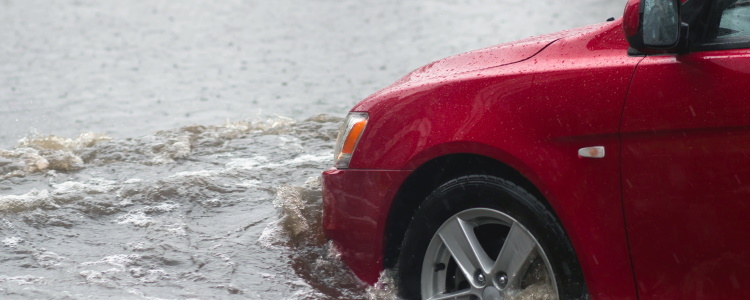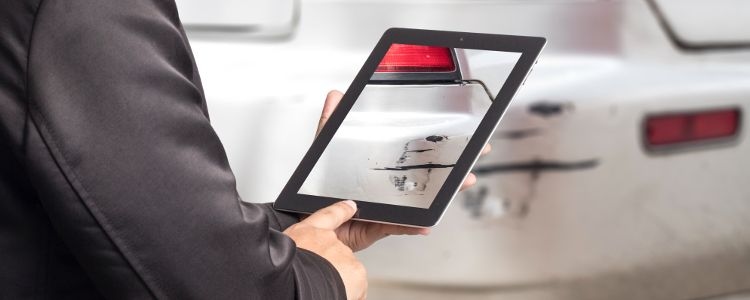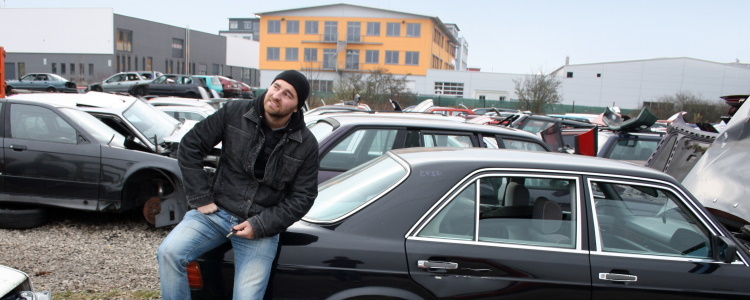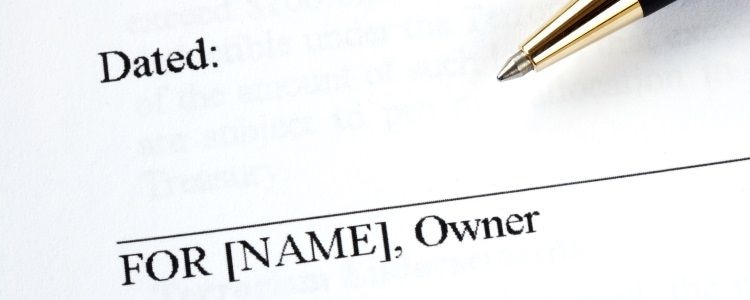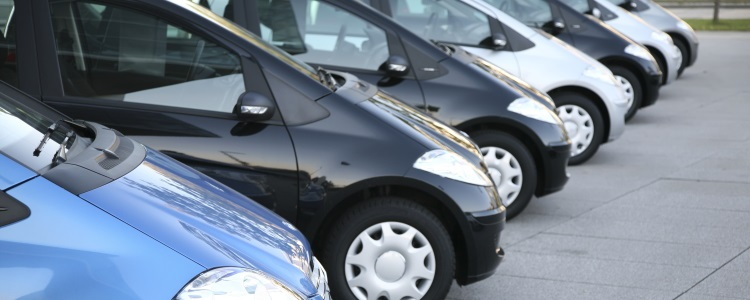When weather turns rough in the U.S. there is a big risk of floods damaging vehicles due to excessive rainfall, hurricanes, and snowmelt to name a few. When rivers breach their banks or storms batter an area there's typically an excess of flood-damaged cars left in the wake. In these times it's important to know what to look for so you don't end up with a vehicle that's been through a flood. Flooded vehicles can pose a major risk to safety due to compromised materials that aren't meant to sustain long-term, or really, any contact with water.

How To Avoid Buying A Flood-Damaged Car
Spotting A Flood-Damaged Vehicle
Spotting a flood-damaged vehicle can sometimes be difficult, especially if great care was taken to ensure the car could fool you, the next buyer. Often, after an area is hit by a natural disaster or flood, cars that were damaged can make their way back onto the market, which poses a risk to unaware buyers. It's important to know what to look for so you can protect yourself from potential harm.
Here are a few signs to look for if you suspect a car has been through a flood:
- Always get a vehicle history report, and check for a branded title.
- Check for signs of water damage like mud or dirt in unlikely places such as under carpeting, under the edges of the dashboard, and inside the trunk. Check under the carpet liner of the trunk, and in all the crevices you can find, and under the hood.
- If the car smells musty, it can be a tell-tale sign of a flood-damaged vehicle. If a car sat in water, you may also see signs of condensation inside light casings, and behind the covering on the gauge cluster. This can be a clear sign that the vehicle was flooded and hasn't dried out properly or completely.
- Check all electrical systems, making sure the lights, radio, and all other components are working properly. If there’s a combination of things that don’t seem to work, it should be considered a red flag.
- Check the underside of the vehicle for excessive corrosion. If you find signs of rust and corrosion on a vehicle in an area of the country where it's uncommon, or in an otherwise newer car, you should walk away. Undercarriage or frame corrosion can lead to excessive damage in an accident, or other issues, like holes in the floor of your car.
- As with any used vehicle purchase, have the car inspected by a trusted, certified mechanic before buying it. During the inspection, the technician will have the opportunity to check areas you normally can’t for water damage, such as the engine compartment and undercarriage.
Any sign that you feel may point toward flood damage should be taken seriously. Be cautious of things like mismatched or brand-new upholstery, carpeting, or other components that don’t seem to belong to the vehicle, especially those that aren’t mentioned by the seller as being replaced.
Risks Of Flood-Damaged Cars
After a vehicle has been through something like a natural disaster, or accident, and is deemed a total loss by the insurance company, the car is then issued a branded title. If the vehicle is deemed a total loss, it's usually given a salvage title after a flood. If the damage was less than half the value of the vehicle, it's possible that it can be refurbished and issued a rebuilt title. This lets buyers know that the vehicle sustained some major damage, even if it's now fixed.
Vehicles with branded titles can be cheaper to buy, but they may cost you more in repairs down the road. This is especially true of a vehicle whose title is branded "flood". Though you may not see problems initially, excessive water damage can affect many parts of the car, including the frame. Water can make the frame of the vehicle corrode, or rust, and this can mean an unsafe structure that's no longer able to protect you like it should in an accident.

Other risks involved in a flood-damaged car can include:
- Electrical damage and brittle wires could lead to a vehicle's computer systems malfunctioning or a risk of fire in electrical components.
- Mold can begin growing on soft surfaces within 24 hours of being soaked with water. This is especially true of dirty water that is teeming with bacteria. Mold can cause serious health issues.
- Mismatched or discolored interiors can be the result of having a vehicle that's been flooded.
- Fluid damage can occur if water gets into critical fluids such as gas or oil. This will result in a vehicle that will either run poorly or won't run at all.
Insuring A Flood-Damaged Car
The only way to get insurance to cover any of the damage sustained to your flooded vehicle, you'll have to have comprehensive coverage before the flood. This is the only coverage that can insure against natural disasters such as fire, wind, floods, and falling objects. It also protects against damage from theft, vandalism, accidents with animals, or broken windows.
If you're planning to purchase a vehicle that's been through a flood, you will likely have trouble getting it insured. Most insurance companies will not issue insurance on a vehicle with a salvage title, such as a flood brand. However, if the vehicle didn't sustain a total loss, and was issued a rebuilt title you may be able to find coverage, though it will likely be expensive, and not full or comprehensive. Typically, due to the safety concerns present after a car has been in standing water, you're most likely to only be able to get liability coverage.
Financing A Flood-Damaged Car
Our best advice is to avoid financing a flood-damaged vehicle. This is an unsafe practice that puts you and your passengers, as well as other drivers at risk. When you finance a vehicle that you know could have major issues down the line, you're leaving yourself open to negative equity, and risk owing more for the vehicle than it's worth. This can put you in a precarious situation should the car break down, leaving you owing on a loan for a vehicle you can't drive, or that you have to sink even more money into.
Vehicle Replacement Incentives
If you're driving a particular brand of vehicle when it's hit by a natural disaster such as a flood, you may qualify for some type of incentive from your manufacturer to replace the car. This is often the case with large automakers after a major weather event like the recent Hurricanes Helene and Milton which rocked the U.S. leaving widespread flooding and damage in their wakes. Many automakers offer incentives to get affected people back into a vehicle and on the road again, whether you're a current customer or not.
However, not all brands participate in these types of incentive programs, so be sure to check online with the automaker to see which incentives are available in your area after a natural disaster.
Right now, several car companies are offering hurricane relief to their clients which can range from a few hundred dollars to a few thousand dollars off a replacement vehicle. Companies like Honda, Kia, Hyundai, Audi, Acura, Ford, GM, and Lincoln are all running relief programs to help affected residents replace their cars.
- Current affected Kia owners in Florida, Georgia, North Carolina, and South Carolina can get $500 off of a 2024 Kia, excluding K5 and Sorento HEV and PHEV models, and all 2025 Kias.
- Hyundai is also offering $500 off new model year 2024 and 2025 vehicles in the same states. Hyundai's program is good for purchase or lease and is good through January 2, 2025.
- Ford and Lincoln are offering their customers 120-day Deferred APR Financing when they purchase a new 2024 or 2025 Lincoln or Ford vehicle. APRs run between 0% and 6.9% for Lincoln models, and 0% to standard rates on Ford models, depending on the year, model, and term you choose.
- Honda is offering $1,000 off a new 2024 or 2025 Honda (excluding Civic Type R and Si models) to anyone affected by a total loss after the recent hurricanes in FL, AL, GA, NC, SC, TN, VA, and WV.
- Audi is offering affected customers $1,000 toward the purchase or lease of a new Audi, all models and years are eligible, except R and RS models. This is extended to consumers affected by Tropical Storm Debby, Hurricane Helene, and Hurricane Milton.
In all cases, you must provide valid proof from your insurance company that your vehicle was considered a total loss as a result of Tropical Storm Debby, Hurricane Helene, or Hurricane Milton, depending on which affected you. Some conditions may apply, see your dealer of choice for details.

Senior Automotive Financing Editor
Meghan has been writing professionally for over 25 years. She is expertly versed in automotive special financing and pricing analysis, having published hundreds of articles on Auto Credit Express and its sister sites, CarsDirect, and The Car Connection. Read more
Suggested Posts For You
Receive Free Updates
Get the latest credit tips, resources and advice delivered straight to your inbox.
